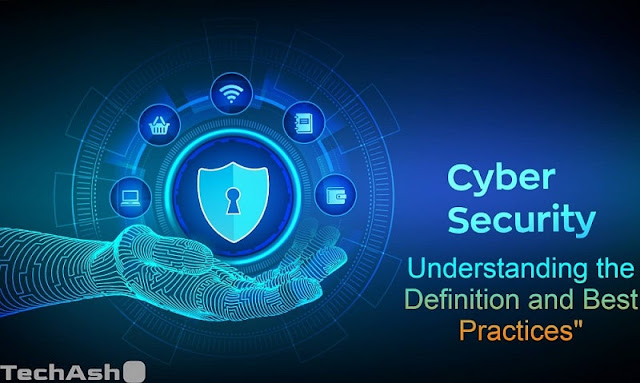In today's digital age, cyber security has become a critical concern for individuals, businesses, and governments worldwide. Cyber security refers to the practice of protecting electronic devices and digital information from unauthorized access, theft, or damage. With increasing reliance on technology in our daily lives, cyber security has become more important than ever before.
What is Cyber Security?
Cyber security is the practice of safeguarding electronic devices and digital information from unauthorized access, theft, or damage. It includes a wide range of measures designed to protect computer networks, software, and data from cyber attacks.
Cyber security threats can be in the
form of malware, phishing, hacking, and ransomware attacks, among others.
Cyber security is essential in today's world because of the increasing number of cyber attacks targeting individuals and organizations. Cyber attacks can cause significant financial and reputational damage to businesses, and they can also result in the theft of sensitive personal and financial information.
Best Practices for Cyber Security
To protect against cyber attacks, it is crucial to implement best practices for cyber security. Some of the best practices for cyber security include:
Encryption
Encryption is the process of converting data into a code to prevent unauthorized access. It is an essential tool for protecting sensitive information such as credit card numbers, passwords, and personal information. Encryption can be used to secure email messages, data stored on electronic devices, and data transmitted over the internet.
Two-factor authentication
Two-factor authentication is a security measure that requires users to provide two forms of identification to access an account. This can be in the form of a password and a code sent to a mobile device or email address. Two-factor authentication adds an extra layer of security to online accounts and makes it more difficult for cyber criminals to gain unauthorized access.
Regular software updates
Regular software updates are essential for maintaining the security of electronic devices. Software updates often include security patches that fix known vulnerabilities and protect against cyber attacks. Failing to update software can leave devices vulnerable to cyber attacks.
Employee training
Employee training is an important aspect of cyber security. Employees need to be aware of the risks of cyber attacks and how to prevent them. Training should include information on how to identify phishing emails, how to create strong passwords, and how to avoid downloading malware.
Backups and disaster recovery
Backups and disaster recovery plans are essential for protecting against cyber attacks. Regular backups can help prevent data loss in the event of a cyber attack, while disaster recovery plans can help businesses quickly recover from attacks.
Cyber Security Jobs
With the increasing demand for cyber security professionals, there are many different career paths available in the field. Cyber security professionals can work in a variety of settings, including government agencies, private companies, and non-profit organizations.
Some of the most common cyber security career paths include:
- Cybersecurity Analyst
- Cybersecurity Consultant
- Penetration Tester
- Security Engineer
- IT Auditor
To pursue a career in cyber security, individuals need to have a strong foundation in computer science, information technology, and mathematics. They also need to have excellent problem-solving skills and the ability to work well under pressure.
How to Learn Cyber Security
Learning about cyber security is essential for anyone who uses electronic devices and the internet. There are many different training options available for individuals interested in learning about cyber security.
Some of the most popular training options include:
- Online courses
- Certifications
- Bootcamps
- Workshops
- College courses
To start learning about cyber security, individuals should research different training options and choose a program that fits their needs and goals. It is also important to stay up-to-date with the latest developments in the field by following industry news and attending conferences and events.
Conclusion
In conclusion, cyber security is a critical concern in today's digital age. By implementing best practices for cyber security, individuals and businesses can protect themselves against cyber attacks and prevent the theft of sensitive information.
With the increasing demand for cyber security professionals, there are many different career paths available in the field. It is also essential for individuals to learn about cyber security to protect themselves online.
FAQs
1. What is the main goal of cyber security?
- The main goal of cyber security is to protect electronic devices and digital information from unauthorized access, theft, or damage.
2. How can I protect myself from cyber attacks?
- You can protect yourself from cyber attacks by implementing best practices for cyber security, such as using strong passwords, regularly updating software, and avoiding suspicious emails and links.
3. What are some common types of cyber security threats?
- Some common types of cyber security threats include malware, phishing, hacking, and ransomware attacks.
4. Is it necessary to have a career in cyber security to protect myself online?
- No, it is not necessary to have a career in cyber security to protect yourself online. However, it is essential to learn about cyber security and implement best practices to protect yourself against cyber attacks.
5. What are the benefits of learning about cyber security?
- Learning about cyber security can help individuals protect themselves online, prevent the theft of sensitive information, and pursue a career in the field.

